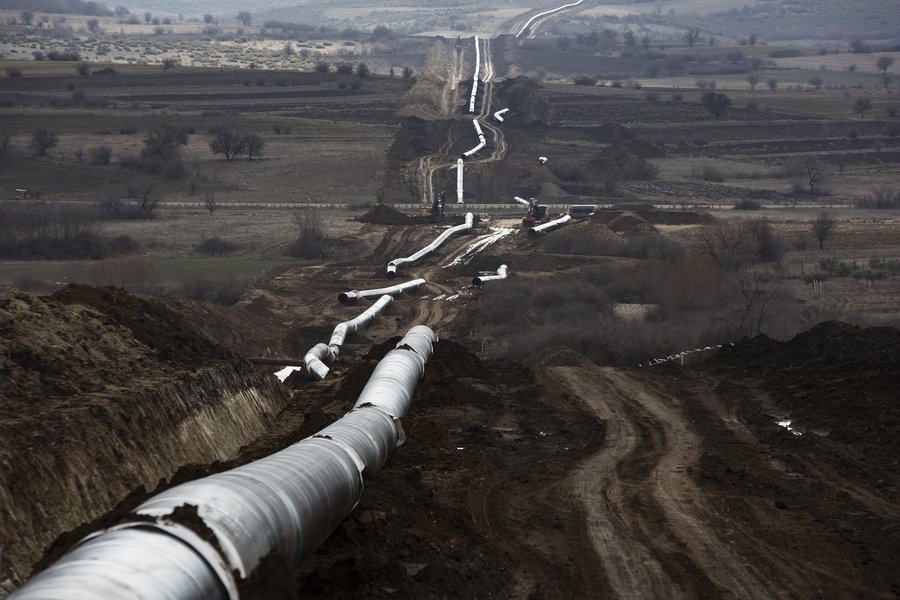There has been much discussion about corporations having too much influence on EU decision making. They don’t. They make the decisions as this article once again proves.
By Dominic Kavakeb, Senior Communications Adviser at Global Witness
Cross.posted from DeSmog UK
Konstantinos Tsakalidis/Bloomberg via Getty Images
There has been much talk in recent weeks of a green recovery from the COVID-19 pandemic and the opportunity to rebuild our economies in a way that protects the climate. But without significant reforms, there is no way the EU will be able to deliver on its bold promises.
At the heart of EU energy policy is a remarkable conflict of interest that is tying the region into gas infrastructure and holding it back from meeting its climate commitments, while steering taxpayer money to subsidise harmful and unnecessary gas projects.
At Global Witness, we’ve just published a new investigation that underlines exactly why this way of doing things is so harmful, as well as what needs to change.
Pipe Down delves into the world of the little-known European Network of Transmission System Operators for Gas (ENTSOG) – a group of powerful companies with a legal mandate to influence EU fossil gas policy. Our research reveals how projects backed by ENTSOG members have received almost 90 percent of EU gas subsidies, worth €4 billion.
Since 2013, the European Commission has chosen gas infrastructure projects that get fast-track treatment and access to subsidies – called “Projects of Common Interest” (PCIs). But these projects must first be suggested by ENTSOG, meaning the Commission overwhelmingly picks PCIs that benefit ENTSOG companies like Italy’s Snam and Poland’s Gaz-System. ENTSOG also influences which PCIs are ultimately picked because it develops the methodology for how prospective PCIs are assessed.
Worryingly, it doesn’t stop there. The Commission uses ENTSOG’s projections for gas demand in its decision-making. But we’ve revealed that the group has consistently produced overinflated forecasts: in the six years to 2019, ENTSOG’s estimates were up to 21 percent higher than actual demand. A recent report by the analytics company Artelys concluded that Europe does not need new gas projects, with existing infrastructure sufficient to meet demand until at least 2030 – even if Russia threatens supplies.
If ever there was an example of why, post-COVID, we need to develop systems that put people and planet at their heart, rather than big business, this is it. The old way of powerful fossil fuel companies writing the very rules they benefit from is an absurdity that surely has no place in the future of Europe. In the wake of the pandemic we need to ensure public money goes to building the clean energy systems of the future, not the damaging, dying industries of the past.
Exposing the influence of ENTSOG couldn’t come at a more important time. Changes to the EU law that enshrines this conflict of interest are currently under review. We are calling for ENTSOG to be stripped of its inappropriate powers.
In practice this means transferring ENTSOG’s forecasting powers to an independent public body and prohibiting ENTSOG members from taking part in meetings where PCI candidate projects are put forward. Furthermore, we want to see the European Commission develop its own methodology for analysing the costs and benefits of PCIs under consideration.
And of course, more broadly, we want to see all fossil fuel projects excluded from becoming PCIs and prohibited from receiving subsidies. Without doing so the EU will always be in danger of missing its climate commitments – something the world simply can’t afford. If the EU is to meet its own current climate targets it must reduce gas consumption by at least 30 percent by 2030.
This starts by curbing the influence of the gas companies for whom protecting the planet usually comes a distant second to protecting their profits. We hope the EU will take the opportunity it now has to free itself from this influence and work towards a sustainable future that benefits the people of the EU and the wider world.



Be the first to comment